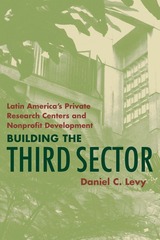3 books by Levy, Daniel

Building the Third Sector
Latin America’s Private Research Centers and Nonprofit Development
Daniel C. Levy
University of Pittsburgh Press
Winner of the 1997 ARNOVA Award for Distinguished Book in Nonprofit and Voluntary Action Research
The private third sector has largely displaced public universities and bureaucracies as Latin America's leaders in social science and related policy activities. In many nations, these private research centers have become the main workplace for intellectuals. Mostly think tanks, they are influential political institutions, often making strong contribution to democratization.
The success of these research centers marks an unsurpassed triumph for international philanthropy, but it also raises questions about the proper role and structural home for research and advanced study. Levy shows how the centers' success often undermine a region's struggling universities while failing themselves to fulfill higher education's fundamental mission.
Levy deals broadly with regional developments, yet systematically identifies and analyzes the crucial subpatterns. He integrates impressive empirical data with conceptual perspectives on nonprofit organizations, comparative politics, and comparative education as well as Latin American studies.
The private third sector has largely displaced public universities and bureaucracies as Latin America's leaders in social science and related policy activities. In many nations, these private research centers have become the main workplace for intellectuals. Mostly think tanks, they are influential political institutions, often making strong contribution to democratization.
The success of these research centers marks an unsurpassed triumph for international philanthropy, but it also raises questions about the proper role and structural home for research and advanced study. Levy shows how the centers' success often undermine a region's struggling universities while failing themselves to fulfill higher education's fundamental mission.
Levy deals broadly with regional developments, yet systematically identifies and analyzes the crucial subpatterns. He integrates impressive empirical data with conceptual perspectives on nonprofit organizations, comparative politics, and comparative education as well as Latin American studies.
[more]

Higher Education and the State in Latin America
Private Challenges to Public Dominance
Daniel C. Levy
University of Chicago Press, 1986
Latin America higher education has undergone an astonishing transformation in recent years, highlighted by the private sector's growth from 3 to 34 percent of the region's total enrollment. In this provocative work Daniel Levy examines the sources, characteristics, and consequences of the development and considers the privatization of higher education within the broader context of state-society relationships.
Levy shows how specific national circumstances cause variations and identifies three basic private-public patterns: one in which the private and public sectors are relatively similar and those in which one sector or the other is dominant. These patterns are analyzed in depth in case studies of Chile, Mexico, and Brazil. For each sector, Levy investigates origins and growth, and then who pays, who rules, and whose interests are served.
In addition to providing a wealth of information, Levy offers incisive analyses of the nature of public and private institutions. Finally, he explores the implications of his findings for concepts such as autonomy, corporatism, and privatization. His multifaceted study is a major contribution to the literature on Latin American studies, comparative politics, and higher education.
Levy shows how specific national circumstances cause variations and identifies three basic private-public patterns: one in which the private and public sectors are relatively similar and those in which one sector or the other is dominant. These patterns are analyzed in depth in case studies of Chile, Mexico, and Brazil. For each sector, Levy investigates origins and growth, and then who pays, who rules, and whose interests are served.
In addition to providing a wealth of information, Levy offers incisive analyses of the nature of public and private institutions. Finally, he explores the implications of his findings for concepts such as autonomy, corporatism, and privatization. His multifaceted study is a major contribution to the literature on Latin American studies, comparative politics, and higher education.
[more]

Holocaust And Memory In The Global Age
Daniel Levy
Temple University Press, 2005
Can collective memories of the past shape the future? If one of the fears about a globalized society is the homogenization of culture, can it nevertheless be true that the homogenization of memory might have a positive impact on political and cultural norms?
Originally published in Germany, The Holocaust and Memory in the Global Age examines the nature of collective memory in a globalized world, and how the memory of one particular event—the Holocaust—helped give rise to an emerging global consensus on human rights.
Daniel Levy and Natan Sznaider show how memories of the Holocaust have been de-contextualized from the original event and offer a framework for interpreting contemporary acts of injustice such as ethnic cleansing and genocide. Representations of mass atrocities in Bosnia and Kosovo during the 1990s resonated with iconographies of the Holocaust and played a significant role in the political and military interventions in the Balkans. Subsequently, these representations have had a crucial impact on the consolidation of international human rights and related issues of transitional justice, reparations, and restitution.
Originally published in Germany, The Holocaust and Memory in the Global Age examines the nature of collective memory in a globalized world, and how the memory of one particular event—the Holocaust—helped give rise to an emerging global consensus on human rights.
Daniel Levy and Natan Sznaider show how memories of the Holocaust have been de-contextualized from the original event and offer a framework for interpreting contemporary acts of injustice such as ethnic cleansing and genocide. Representations of mass atrocities in Bosnia and Kosovo during the 1990s resonated with iconographies of the Holocaust and played a significant role in the political and military interventions in the Balkans. Subsequently, these representations have had a crucial impact on the consolidation of international human rights and related issues of transitional justice, reparations, and restitution.
[more]
READERS
Browse our collection.
PUBLISHERS
See BiblioVault's publisher services.
STUDENT SERVICES
Files for college accessibility offices.
UChicago Accessibility Resources
home | accessibility | search | about | contact us
BiblioVault ® 2001 - 2024
The University of Chicago Press









